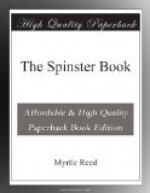On the contrary, a widow’s second husband is often the most sincere mourner of her first. As time goes on, he realises keenly what a doleful day it was for him when that other died. “Death loves a shining mark,” and that first husband was always such a paragon of perfection that it seems like an inadvertence because he was permitted to glorify this sodden sphere at all. She keeps, in heart at least, and often by outward observance, the anniversaries of her former engagement and marriage. The love letters of the dead are put away with her jewels and bits of real lace.
Small defections are commented upon and odious parallels drawn. Her home is seen to be miserably inadequate beside the one she once had. Her supply of pin money is painfully small, judged by the standard which has hitherto been her guide. Callers are entertained with anecdotes of “my first husband,” and her dinner table is graced with the same stories that famous raconteur was wont to tell.
If her present husband pays her a compliment, he is reminded that his predecessor was accustomed to say the same thing. The relatives of the first wife are gently made aware that their acquaintance is not desired. His manner of life is carefully renovated and his old friendships put away with moth balls and camphor, never to see the light again.
[Sidenote: The Best Advertisement]
Yet the best possible advertisement of matrimony is the rapidity with which the bereaved seek new mates. There is no more delicate compliment to a first marriage than a second alliance, even when divorce, rather than death, has been the separating agency. A divorced man has more power to charm than a widower, because there is always the supposition that he was not understood and that his life’s happiness is still to come.
[Sidenote: Forgetting]
Forgetting is the finest art of life and is to be desired more than memory, even though Mnemosyne stands close by Lethe and with her dewy finger-tips soothes away all pain. The lowest life remembers; to the highest only is it given to forget.
Yet, when the last word is said, this is the dread and the pity of death. It is not “the breathless darkness and the narrow house,” but the certain knowledge that one’s place can almost instantly be filled. The lips that quiver with sobs will some day smile again, eyes dimmed by long weeping will dance with laughter, hearts that once ached bitterly will some day swell and overflow with a new love.
This knowledge lies heavily upon a woman’s soul and saddens, though often imperceptibly, the happiest marriage. All her toil and striving may some day be for naught. The fruits of her industry and thrift may some day gleam in jewels upon the white throat of another woman. Silks and laces which she could not have will add to the beauty of the possible woman who will ascend her vacant throne.
Sometimes a woman remains faithful to a memory, and sometimes, though rarely, a man may do the same. There is only one relation in life which may not be formed again—that between a mother and her child.




